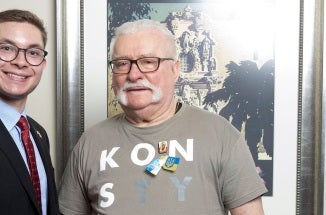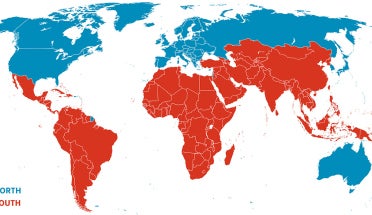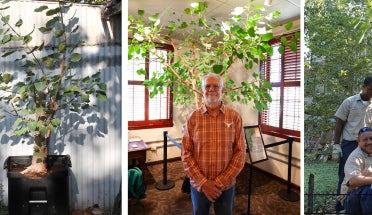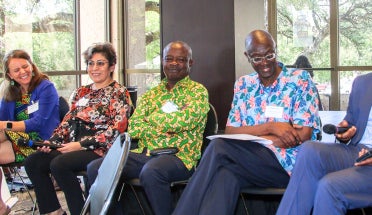
Polish Club Hosts Nobel Prize Winner Lech Wałęsa to Speak on Ukraine
- Nov 16, 2022
- by Kayla Johnson
Nathan Silverstein has always felt connected to his Polish heritage. Growing up, he was enthralled by stories of his mom’s childhood in Gliwice, Poland, and how her father risked his life to fight tyranny, first against Nazi Germany and then against the Soviet Union.
Silverstein said Poland overflows with heroes — from Witold Pilecki, a resistance leader who intentionally got captured by the Nazis to document Auschwitz’s horrific conditions, to Marek Edelman, who helped lead the Warsaw Ghetto Uprising.
“You can look back pretty much since the beginning of Polish history and find someone to admire,” said Silverstein, a junior government major. “Of course, there are also a lot of living heroes today.”
Silverstein said it’s impossible, having been instilled with heroic stories from a young age, not to be proud of his heritage and want to share it with others. Inspired by such luminaries, he started UT Austin’s Polish Club in 2021 as a space for students to learn about and celebrate Polish culture and history.
The Polish Club seeks to create a community of students from across the diaspora but also welcomes non-Polish participants. Members immerse themselves in Polish customs by embarking on field trips to heritage sites, leading language-learning circles, cooking traditional food together and engaging with current global affairs through guest lectures.
The club began modestly with only 5-10 members, but Silverstein said it quickly became a leading Slavic-speaking organization on campus. His mother was the group’s first speaker, describing the night before the government imposed martial law in Poland in 1981 and the volatile aftermath. Next, parents of other club officers volunteered to share their memories of navigating the political instability and revolution.
The club soon expanded to welcome central figures from the wider Texas Polonia, including representatives from the Polish American Council of Texas.
Silverstein said the club’s focus on fostering fellowship created a “positive domino effect,” allowing club members to build a rapport with local leaders and begin organizing higher-profile events. Soon the club would host Polish dignitaries such as former Polish Presidents Aleksander Kwaśniewski and Bronisław Komorowski.
“One person connects you to the other, and then you have the confidence to pursue it, and you make a good impression,” Silverstein said.
On May 5, 2022, the Polish Club hosted another hero when, with the help of Texas Global’s Internationalization Event Fund, they welcomed Lech Wałęsa, Nobel Peace Prize winner and former president of Poland, for a special lecture on the global impact of Russia’s war on Ukraine.
Wałęsa, a shipyard electrician turned labor activist, was a leader of the 1980s Solidarność (Solidarity) movement against communist rule in Poland. Solidarity was the first independent, state-recognized trade union in a Warsaw Pact nation and evolved into a social movement that drew more than 10 million supporters at its height.
The movement utilized non-violent tactics, including controlled strikes and mass rallies, in resistance to authoritarianism, strengthening the power of the worker to effect change. When martial law was established in Poland, Solidarity was largely pushed underground, but its second wave in the late ’80s, aided by reforms under Soviet Union President Mikhail Gorbachev, led to roundtable talks that introduced semi-free elections.
As Poland’s first president voted in by popular election, Wałęsa served 1990-1995 and worked to transform the country into a capitalist liberal democracy. He received the Nobel Peace Prize in 1983 for his efforts to bring freedom to the nation and end the Cold War.
Silverstein said that, considering UT’s legacy of hosting world-historical figures, from the Dalai Lama to Martin Luther King Jr., it was almost inevitable that the university would host President Wałęsa. He added, “I’m just lucky I was part of that process and able to help make that happen.”
The Clements Center for National Security helped organize the event’s logistics, Silverstein said, by providing funding, helping him communicate effectively with high-level officials and securing staffing. Additional sponsorship came from the Center for Russian, East European, and Eurasian Studies; the Center for European Studies; the Department of Government; the Liberal Arts Honors Program; and the McCombs School of Business.
Wałęsa’s speech emphasized the power of individuals to oppose expansionism and oppression, said Silverstein. It drew on parallels between Poland’s confrontations with tyranny and the ongoing Russia-Ukraine War. The former president also acknowledged the unique ways in which conflict resolution is evolving as a consequence of the world becoming increasingly interconnected.
“The ‘countries and nations’ age is coming to an end, and on the horizon, we see the age of globalization, intellect and technology. But we are still in between,” Wałęsa said, remarking that in this transitional stage, nations must carefully re-evaluate how they negotiate peace and deal with the rise of demagogues.
After months of military mobilization in the surrounding region, including in Belarus and Crimea, Russia stunned much of the world when it invaded Ukraine in February 2022. The invasion has been denounced internationally as an unprovoked war of aggression, and many have accused Moscow of violating international law and impeding Ukrainian sovereignty.
Like Wałęsa, Ukraine's President Volodymyr Zelenskyy rose from humble origins to defend his country on the world stage. Zelenskyy made a career as a comedian and actor before running for president in 2019, and has grown into a respected leader. In the face of the escalating danger at the onset of the war, he refused U.S. offers to evacuate Ukraine’s capital city of Kyiv. He stated, “The fight is here; I need ammunition, not a ride.”
Zelenskyy has been championed as a global symbol of resistance, praised for his morale-boosting speeches and steadfast determination. Ukraine has received military and humanitarian aid from NATO member countries and their allies, and the popular slogan “I Stand with Ukraine” has become emblematic of the country’s widespread support.
“Just a couple of years ago, he was an actor,” Silverstein said of Zelenskyy, “and now he’s the man fighting for freedom across the world.”
Silverstein said that while Polish history may seem obscure to some, there is a large community of Slavic-speaking students on campus eager to learn from its heroes and uplift their own. He said the Polish Club plans to continue hosting high-profile events to shed light on the universality of issues and current events facing Europe and the world.
Above all, Silverstein said, he hopes to inspire other leaders on campus to keep working hard toward their own goals and advocating for critical social issues. He encouraged other blossoming organizations, saying, “Believe in the power and importance of your organization's message.”



